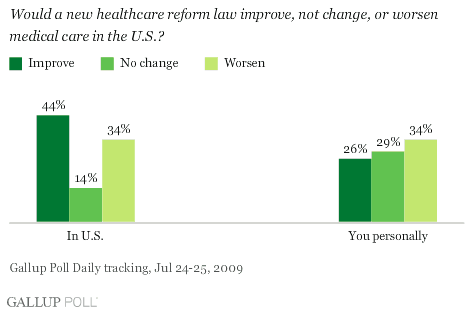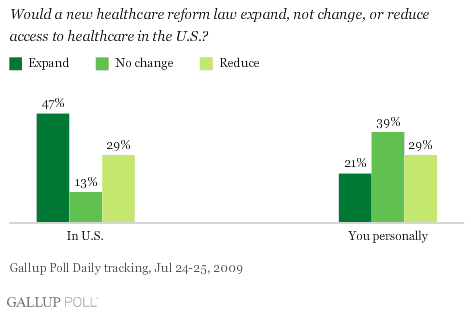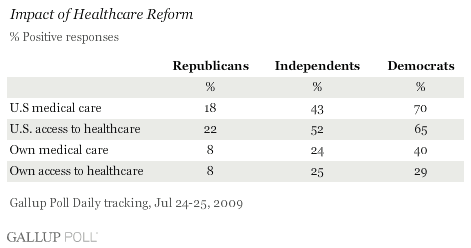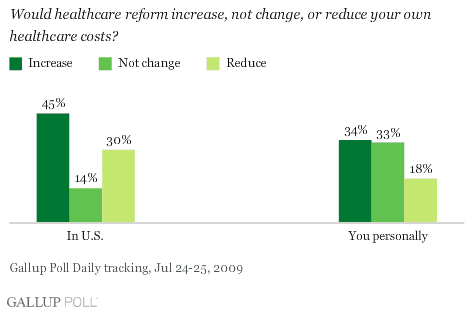PRINCETON, NJ -- Forty-four percent of Americans believe a new healthcare reform law would improve medical care in the U.S., contrasted with 26% who say it would improve their personal medical care. Forty-seven percent of Americans believe reform will expand access to healthcare in the U.S., while 21% say it will expand their own access to healthcare.


These results are important because much of the debate on healthcare reform rests on the assumption that it is imperative to fix what is assumed to be a broken healthcare system in the U.S. One aspect of the healthcare debate focuses on the benefits of healthcare reform to the country as a whole, while another addresses the benefits to the average American. Yet the majority of Americans are not sold on the notion that reform would have a positive effect on either.
The wariness with which the public approaches the possible effects of healthcare reform on their personal situations is evident from results showing that more Americans say healthcare would worsen their medical care and reduce their access to healthcare, than say it would have the contrasting, positive effects. These "net negative" results contrast with the net positive perceptions Americans have about the likely impact of healthcare reform on the U.S. more generally -- albeit one that is quite muted.
Partisan Reactions
Healthcare reform is being pushed by a Democratic president and leaders in a Democrat-controlled House and Senate. Thus, it is not surprising to find that Democrats are much more likely to say that healthcare will have a positive effect, across all dimensions, than are independents or Republicans. This is particularly the case when it comes to the two questions asking about the effects of healthcare reform on U.S. medical care and access to healthcare nationally. While 70% and 65% of Democrats agree that reform will have a positive effect on these dimensions, respectively, only 18% and 22% of Republicans agree.

Less than 1 out of 10 Republicans say that healthcare reform will have a positive effect on their personal medical care or access to healthcare, compared with a somewhat higher percentage of Democrats who hold these views. Independents' views on the impact of healthcare reform are in the middle between the Republican and Democrat extremes.
Costs
It appears to be a commonly held belief that healthcare reform will increase costs for the country as a whole and for the respondents personally, rather than decreasing these costs. Forty-five percent say that a new healthcare reform law would increase healthcare costs in the U.S., while 30% say it would reduce them. Thirty-four percent say a new healthcare reform law would increase their personal costs, while 18% say it would reduce them.

When Americans say that their personal healthcare costs will increase if a new reform law is passed, it could mean that these individuals perceive that they will pay doctors, hospitals, and providers more money, or that they will be paying more for all Americans' healthcare indirectly, through higher taxes. Whatever the case, the data show that a third of Americans believe their costs will go up in some way if healthcare reform is passed, almost twice as many as say their personal costs will go down.
Bottom Line
These results do not coalesce into a terribly optimistic picture of Americans' views of the perceived impact of healthcare reform:
- Whether the focus is access to healthcare or the quality of care, less than a majority of Americans are convinced that healthcare reform will be beneficial to either the country or to their own personal situations.
- Americans are less likely to believe healthcare reform will result in improvements to themselves personally than to the national healthcare situation.
-
Americans believe that healthcare reform will increase costs rather than lower them, both nationally and for themselves.
Survey Methods
Results are based on telephone interviews with 2,017 national adults, aged 18 and older, conducted July 24-25, 2009. For results based on the total sample of national adults, one can say with 95% confidence that the maximum margin of sampling error is ±3 percentage points.
For results based on the sample of 485 national adults in the Form A/C half-sample, the maximum margin of sampling error is ±6 percentage points. For results based on the sample of 559 national adults in the Form A/D half-sample, the maximum margin of sampling error is ±5 percentage points.
Interviews are conducted with respondents on land-line telephones (for respondents with a land-line telephone) and cellular phones (for respondents who are cell-phone only).
In addition to sampling error, question wording and practical difficulties in conducting surveys can introduce error or bias into the findings of public opinion polls.
